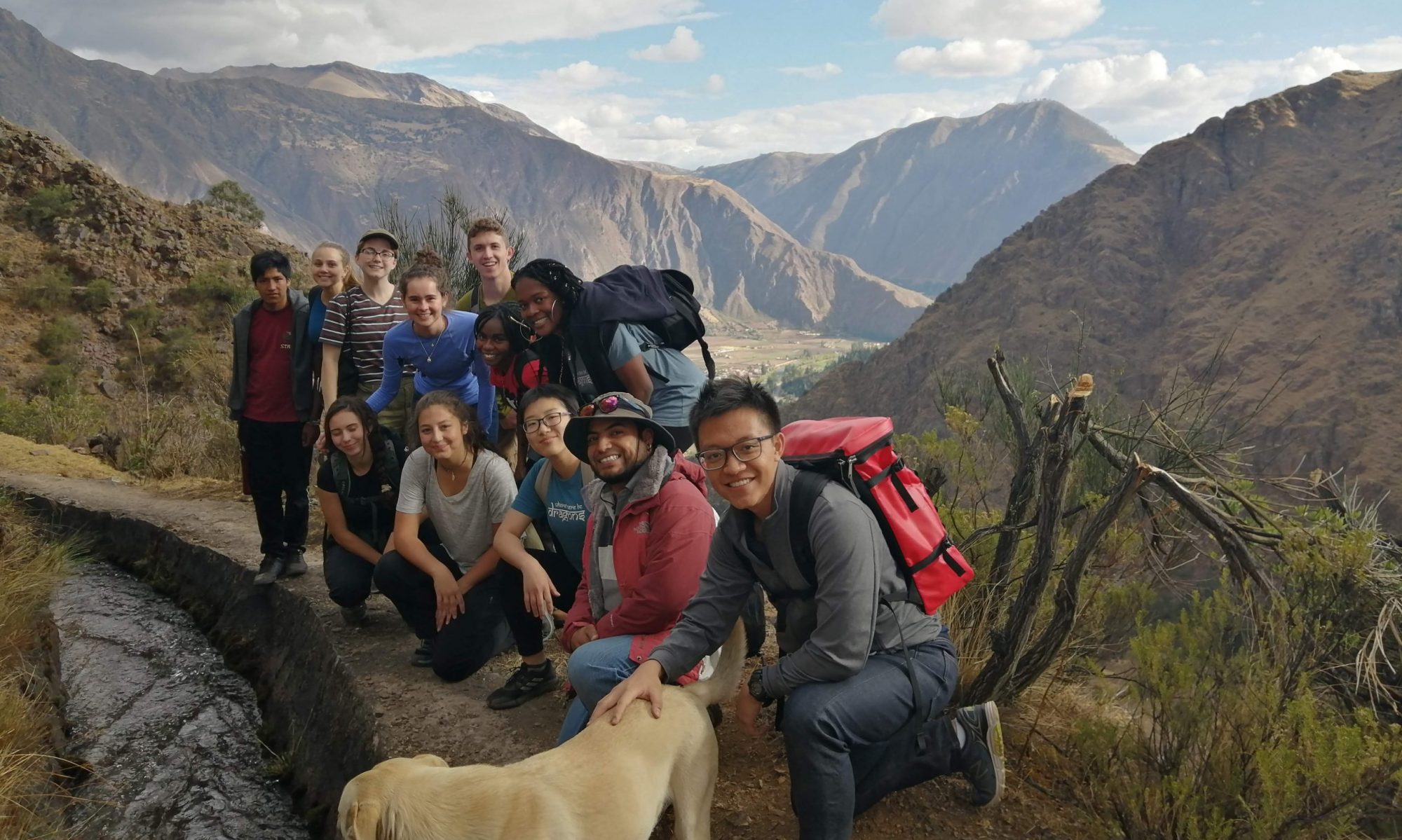by Natalie
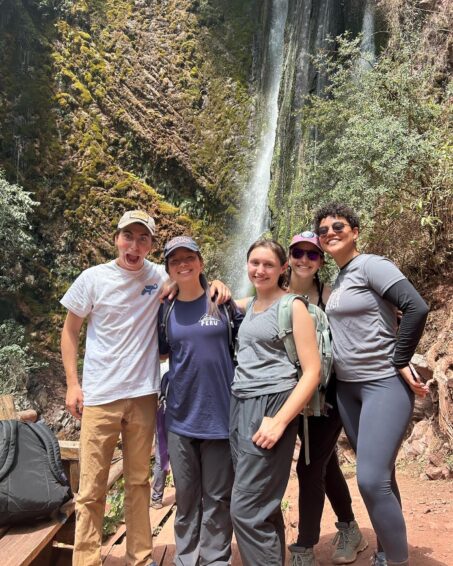
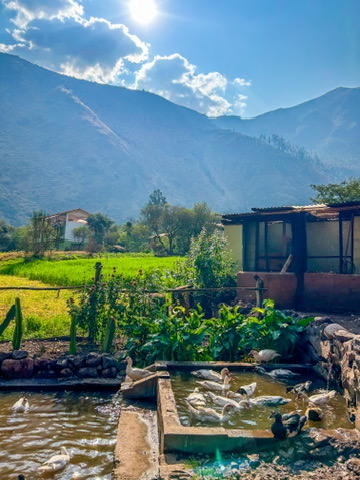
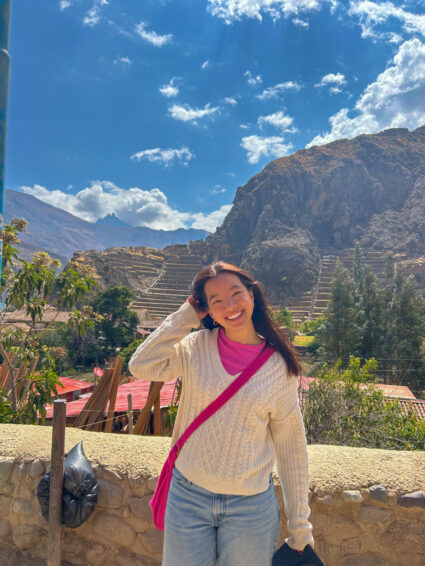
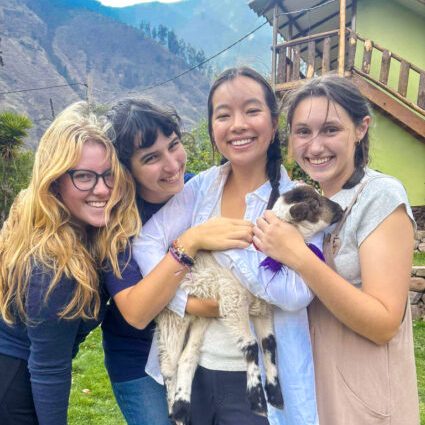
It’s crazy to think that I’ve already been in Peru for over a month! This weekend we move in with our host families and I’m very excited. So far, we’ve done a lot already. We’ve been taking Spanish classes, a Latin American Civilization class, and of course our Pathways class. We’ve explored Urubamba, Cusco, and Paru Paru. We’ve gone on hikes and adventures, had bonfires, eaten delicious Peruvian food, spoken to locals in the Plaza and main market, shared group bus rides and movie nights, had fun family dinners, seen the Milky Way in the night sky, and so much more. I can’t even begin to express how happy I am to be in Peru, especially with this group.
Although Urubamba isn’t the biggest place, there’s still lots to see and do. I have a couple of favorite places that I tend to go for meals, including Antojitos and Migas. Antojitos is a bakery and restaurant with a cozy atmosphere and twinkle lights hung everywhere. It’s a great place to go for a coffee, a meal, a slice of cake, or just to hang out. I also sometimes go to Migas. It’s a more European-style cafe with less traditional Peruvian food options. It’s a great place for when I need some comfort foods.
We also really enjoy going to a local Karaoke restaurant called Kachi-Wasi. Many of our meals that come to the house are from there as well. It has very good traditional Peruvian food and also great desserts too. On Karaoke nights, we all get together and sing anything from 2000s US pop music to slower songs in Spanish. It’s a great place to get together and sing and dance on the weekends.
I’ve enjoyed getting to learn more about the local culture and traditions of Peru. In our spare time, sometimes we have extra lessons in things such as the Politics of Peru, Peruvian History, and Quechua lessons. Although I knew some about Peru due to my nonprofit, Sisters Project Peru, I am still always eager to learn more. Although I had heard the Fujimoori name, I didn’t know the true complexity of the family until our in-depth Politics lesson. Additionally, I had learned some about Andean religion but had not heard about the belief that in the afterlife a person must cross the whole Milky Way to be reincarnated. They can do this with the help of a dog that they had in their life, and generally, a black dog is best suited for the job because it is the least concerned about getting its’ fur dirty. There is also a belief in 3 different worlds. One is our reality, another is kind of like the underworld, and the other is similar to heaven. The underworld is represented by the snake, our reality by the puma, and the heavens by the condor. Unlike Christian religions, the underworld is not a bad place. It is simply a continuation of the circle of life. While reincarnation does occur, it is not immediate because of the long journey that needs to be made through the Milky Way.
I also really like learning about the integration of Andean traditions with those of Spanish to ensure that Andean ideas didn’t fully disappear. For example, Peruvians used to place two llamas with offerings to Pachamama (the mother Earth) on the tops of their houses for protection. These llamas always had to be gifted instead of bought. When the Spanish came, the llamas were changed to bulls so that the Spanish thought the Peruvians were showing them deference. In reality, the tradition lived on because the Peruvians continued making offers to Pachamama within the bulls (such as llama fat and coca leaves) and continued to have protection over their houses right under the noses of the Spanish.
This leads to my next point; the appreciation for nature here. Multiple times since getting here, we have done ceremonies in appreciation to Pachamama. There is so much gratitude and respect for the Earth here that I have never seen back home. The Earth is not something to destroy and conquer, but it is something to work with and cherish. A concrete example of this is when we went to visit Paru Paru, an indigenous community close to Pisaq. Every 7 years they change the land that they work on to keep it from getting too tired. They also grow 180 types of potatoes and have a very deep and close knowledge of each type of potato, naming each and memorizing their characteristics. We also did multiple ceremonies while there, offering coca leaves in appreciation of the beautiful mountains and land surrounding us. Each mountain has a name and in Andean culture, mountains are called ‘Apus’ and are seen as Godlike beings.
I’m just so in awe of the reverential way that the Earth is treated here. As a child, I spent a lot of time playing and appreciating nature as I’m sure many others have. But as is natural, when I got older there became a distance between me and the Earth as things like school, jobs, work, and ‘civilized’ society became more prevalent. And that’s another thing that I’ve been contemplating a lot based on the readings we’ve done in Latin American Civilization Class combined with the culture of appreciating the Earth here in Peru; why is so much of civilization based on separating ourselves from nature? Of course, the answer goes back to one of the first readings we did, which explained how our idea of progress has been shaped by those who got to narrate history. The colonizers came and did their best to destroy the cultures of the Indigenous that respected the Earth, introducing the idea that progress was working against the Earth. That belief permeated into the very world that we exist in today. So as we grow up, we ‘progress’ and spend less time in nature. We go and work in office buildings that have been built on land that used to be full of trees and meadows. We go to supermarkets and decide if we should spend $3 more dollars on that piece of fruit just because it was grown without the pesticides that kill our pollinators.
I guess what I’m trying to say is that I’m enjoying being able to get back in touch with nature and understand some of why our society is so against working with it. I’m intrigued by the many steps that separate us from the very human process of growing our food and eating it. Before falling asleep, I think about what the world would have been like if our idea of progress was different and the indigenous ideals I’m learning about now had been taught to me as a fact of life since I was a child. I spend more time appreciating nature and looking around me at the little things. The more I learn about Peru, the more questions I seem to have.
I guess what I’m trying to say is that when I wake up every morning surrounded by the beautiful Peruvian mountains, the sun shining, surrounded by wonderful people, and the day bursting with the possibility of new ideas, I feel so very grateful to be here. Of course, I miss my friends and family back home, and some days the amount of new things can be overwhelming. But I also know that every day I am growing, learning, and changing alongside the best possible group I could ask for.
Originally posted here.
